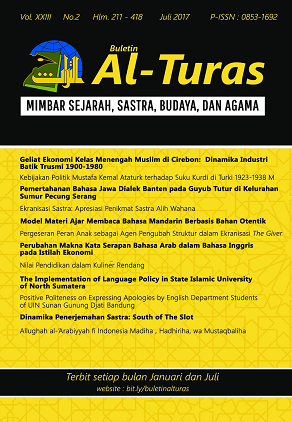Kebijakan Politik Mustafa Kemal Ataturk terhadap Suku Kurdi di Turki 1923-1938 M
DOI:
https://doi.org/10.15408/bat.v23i2.6374Keywords:
policy, politics, Mustafa Kemal Ataturk, the Kurds, TurkeyAbstract
Abstract
This study answered a question why Mustafa Kemal Ataturk’s administration set a policy against the Kurds in Turkey in 1923-1938 M. To answer these questions, the author delves myriads of written sources using political approaches. The analysis of this study finds that the enactment of policies towards the Kurds in turkey due to the gap ideology and religion were very strong between the Kurds and the Mustafa Kemal Ataturk’s administration. That can inhibit the existence of ethnic Kurds, either in the areas of social, economic, religious, cultural or political. This study also finds when a tribe and nation hampered its existence, they would do such riots, either physical (as do the military war, war bombs) or non-physical (such as a demonstration of a written or unwritten through social media, magazines, newspapers, articles, etc.), to people in power. Thus people who mastered feel deep discrimination and consequently the controlled and controlling equally get the loss.
---
Abstrak
Studi ini menjawab sebuah pertanyaan yaitu mengapa Pemerintahan Mustafa Kemal Ataturk membuat sebuah kebijakan melawan orang-orang Kurdi di Turki pada 1923-1938 M. Untuk menjawab pertanyaan ini, penulis menganalisis banyak sumber-sumber tertulis menggunakan pendekatan-pendekatan politik. Analisis dari studi ini menemukan bahwa pemberlakuan kebijakan terhadap orang-orang Kurdi di Turki terkait dengan gap ideologi dan agama sangatlah kuat antara orang-orang Kurdi dan Pemerintahan Mustafa Kemal Ataturk. Hal ini bisa mengancam eksistensi etnis Kurdi, baik dalam tataran sosial, ekonomi, agama, budaya, maupun politik. Studi ini pun menemukan ketika sebuah suku dan bangsa berada di ujung tanduk, mereka akan melakukan semacam pemberontakan, baik secara fisik (perang militer, perang bom) atau non fisik (demonstrasi tertulis atau tidak tertulis lewat media sosial, majalah-majalah, Koran-koran, artikel-artikel dan lain sebagainya), kepada mereka yang sedang berkuasa. Kemudian, orang-orang yang dikuasainya merasakan adanya diskriminasi yang mendalam dan akibatnya orang yang dikuasai dan yang menguasai sama-sama mendapatkan kerugian.DOI : 10.15408/bat.v23i2.6374
References
Buku:
Ahmad, Feroz. “Turki” Ensiklopedi Oxford Dunia Islam Modern. John L. Esposito; Terj: Eva Y. N., at all. Bandung: Mizan, 2001.
Bois, TH. “Kurds, Kurdistan” The Encyclopaedia of Islam. New Edition; Vol. V, KHE-MAHI, Leiden: Tuta Sub Aegide Pallas. E.J. Brill, 1986.
Bozarslan, Hamit. “Kurds and The Turkish State” The Cambridge History of Turkey. Editted by: Resat Kasaba, Vol. 4, Turkey in The Modern World, New York: The Cambridge University Press, 2008.
Bradshaw, David. After the Gulf War: The Kurds. The Middle East Journal. Published by: Royal Institute of International Affairs. Middle East: 1991.
Gunter, Michael M. The Kurdish Question in Perspective. Vol. 166, World Affairs, Spring 2004,
Harris, George S. Ethnic Conflict and The Kurds. Annals of the American Academy of Political and Social Science. Vol. 433. Ethnic Conflict in the World Today 1977.
Hitti, Philip K. History of The Arabs. Terj: R. Cecep Lukman Yasin dan Dedi Slamet Riyadi. Jakarta: PT Serambi Ilmu Semesta, 2002.
Isikozlu, T. - Isikozlu, E.F. “Diyarbakir” Encyclopedia Of Modern Asia, New Edition; Vol. III, H-IRAM. Leiden: Tuta Sub Aegide Pallas. EJB, 1971.
Kasliwal, R. R. The Foreign Policy Of Turkey Since 1919. The Indian Journal of Political Science. Vol. 7, No. 1-2. Indian Political Science Association, 1945.
Kayali, Hasan. “The Struggle for Independence” The Cambridge History of Turkey, Editted by: Resat Kasaba. Vol. 4, Turkey in The Modern World. New York: The Cambridge University Press, 2008.
Kili, Suna. Kemalism in Contemporary Turkey. International Political Science Review / Revue Internationale de Science Politique, Vol. 1, No. 3, Political Ideology: Its Impact on Contemporary Political Transformations 1980.
Lapidus, Ira. M. Sejarah Sosial Ummat Islam. Jakarta: PT Raja Grafindo Persada, 1999.
McDowall, David. “The Kurdish Question: a historical review” The Kurds: A Contemporary Overview. edited by Philip G.Kreyenbroek and Stefan Sperl. London and New York: Routladge, Taylor and francis group, 1992.
McDowall, David. A Modern History of The Kurds. London,: I.B. Tauris, 2005.
Mughni, Syafiq A. Sejarah Kebudayaan Islam di Turki. Jakarta: Logos, 1997.
Nasution, Harun. Pembaharuan dalam Islam (Sejarah Pemikiran dan Gerakan). Jakarta: PT Bulan Bintang, 1992.
Ocalan, Abdullah. War an Peace In Kurdistan (Perspektives For a Political Solution of The Kurdish Question). International Initative: 2008.
Syalabi, Ahmad. Sejarah dan Kebudayaan Islam: Imperium Turki Utsmani. Jakarta: Kalam Mulia, 1988.
Tim Penyusun Kamus Pusat bahasa. Kamus Besar Bahasa Indonesia. Jakarta: Balai Pustaka, 2007.
White, Jenny B. “Islam and Politics in Contemporary Turkey” The Cambridge History of Turkey. Editted by: Resat Kesaba, Vol. 4, Turkey in Modern World. New York: Cambridge University Press, 2008.
Yegen, Mesut. Prospective-Turks or Pseudo-Citizens,Kurds in Turkey. Middle East Journal, Vol. 63, No. 4 Autumn, 2009.
Zardykhan, Zharmukhamed. Ottoman Kurds of the First World War Era: Reflections in Russian Sources. Vol. 42, No. 1, Middle Eastern Studies, 2006.
Zurcher, Erik J. Sejarah Modern Turki. Jakarta: PT. Gramedia Pustaka Utama, 2003.
Internet:
http://www.aljazeera.com/news/europe/2007/10/2008525183331270946.html. Akses: 05 Desember 2014 pukul 09:30 WIB.
http://www.kurdipedia.org/documents/88606/0001.PDF. Akses: 03 Januari 2015 pukul 22:56 WIB.







